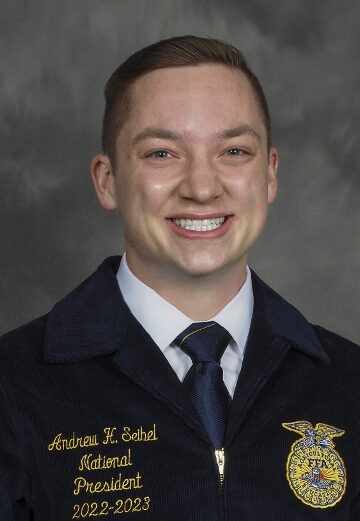There’s really never been a time in my life when the National FFA Organization wasn’t a part of it. Growing up in rural Virginia, I watched my family members get involved in FFA, and then witnessed Brian Walsh, also from Virginia,elected as a National FFA Officer in 2014. Seeing someone from my home state get elected was a truly memorable moment for me. I remember watching him and thinking, “that could be me one day.”
But there was a time when I doubted whether or not FFA was even the best path. I recall being in a really low place during my junior year of high school, and my overall confidence had taken a nosedive. It wasn’t until I was pulled up by fellow FFA members at FFA camp that the student-led organization took on a completely different meaning for me. These were my teammates, my community, and my support system, who were there to encourage me to move forward. I knew FFA encompassed a much deeper meaning.
The impact of agricultural education and FFA on Gen Z
After nearly 10 years of being involved in FFA, I received the title of National FFA President, which was a dream come true for me. I’ve been fortunate to travel the country, speak at conventions and other events, and work one one-on-one with other FFA members who are aspiring to become leaders. I feel incredibly fortunate to have this platform among my peers so that I can pour support and inspiration into others, just as FFA members have done for me.
FFA is a space for everyone, and allows students to become leaders and the best versions of themselves.
Through numerous events, the dedication of our agricultural educators, the support from corporate sponsors, etc., it’s clear that agricultural education and FFA aren’t just about farming or blue jackets. It’s become a pathway for nearly 250 careers in agriculture.
While the career opportunities are there, I want to also emphasize the soft skills that are gleaned from this community. Being a part of Gen Z, it’s evident that we’re living in a time of social divide, distress and sometimes fear. According to a study by Cigna, many Gen Zs are worried about the future. No matter one’s age, or where they grew up, the realities of today can be a lot to carry, and Gen Z is the up-and-coming workforce that will need to be equipped to face a lot of these challenges.
It’s having a sense of community, and having fellow peers who understand the values of empathy, critical thinking, rapport building, creativity, and many other attributes that will prepare our future leaders for success. At times, there’s a misconception that Gen Zs aren’t going to have a strong enough work ethic, and that since we’ve only known a world of 24/7 access to the internet, we may lack those soft skills. What’s special about FFA and agricultural education is that they clearly present hands-on, project-based learning opportunities to students. Agricultural teachers across the country are serving as mentors to young learners, showing them that a rural background isn’t necessary to have a future in an industry that can truly impact the world.
What’s next?
I’m currently in college and anticipate pursuing a career in agriculture. I know, without a doubt, that if it hadn’t been for the support of my family, and my friends through FFA, I wouldn’t be the person I am today. I can wake up every morning feeling truly thankful for those who believed in me, and I plan to do all that I can to ensure other students have that same support and know there’s a place for them to excel.
By: Andrew Seibel, National FFA President
Andrew Seibel’s journey with FFA started when he was a baby and attended his first National FFA Convention. FFA is a family tradition; his dad taught agricultural education before becoming state staff for Virginia FFA. “Growing up in this organization is a true blessing,” Seibel said. “But it was when I realized that I could be my own person through the blue jacket that I really began to fall in love with the organization and see how many opportunities it truly held.” This year, Seibel hopes to cultivate an environment that makes every student feel seen and heard. “I want it to be a place where every person knows that they are worthy as they are and will never need to be anyone but themselves to be successful.”

